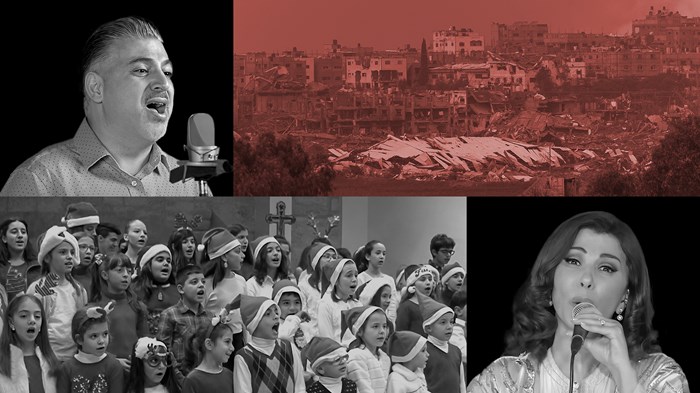
This past holiday season—like many before it—the Arab world’s favorite Christmas carol spoke directly to war and suffering.
With Orthodox Christians observing their 12 days of Christmastide from January 7–19, their churches in the Middle East were the latest to sing “Laylat al-Milad” (On Christmas Night). Written in the 1980s during Lebanon’s civil war, the song has been performed by classical divas, worship leaders, and children’s choirs alike. It has offered comfort during the regional conflicts since, from the Syrian civil war to ISIS’s reign of terror to the current war between Israel and Hamas in Gaza.
Its haunting melody and lyrics speak less about a baby in a manger than the life that baby demands that we live. And also of the life that baby makes possible:
Chorus:
On Christmas night, hatred vanishes
On Christmas night, the earth blooms
On Christmas night, war is buried
On Christmas night, love is born
Verse 1:
When we offer a glass of water to a thirsty person, we are in Christmas
When we clothe a naked person with a gown of love, we are in Christmas
When we wipe the tears from weeping eyes, we are in Christmas
When we cushion a hopeless heart with love, we are in Christmas
Verse 2:
When I kiss a friend without hypocrisy, I am in Christmas
When the spirit of revenge dies in me, I am in Christmas
When hardness is gone from my heart, I am in Christmas
When my soul melts in the being of God, I am in Christmas
The Christmas season in the Middle East can be a double blessing. Advent begins one month before the Catholic and Protestant holiday on December 25, while festivities continue weeks further until the Orthodox celebration on January 7 and its Epiphany on January 19. But this season, in sympathy with a muted Christmas in Gaza, Holy Land Christians canceled their public revelry.
Yet they still gathered to sing and worship in church.
In Israel’s northern town of Kafr Yasif, the Baptist church “kissed their friends” in congregational greeting as the praise band led a joyous rendition of “Laylat al-Milad.” In Amman, Jordan, an evangelical orphan ministry gathered around 300 Muslim and Christian at-risk children to celebrate, as the Baptist school choir serenaded their parents. And in Erbil in Iraq’s Kurdistan region, the Alliance church included the carol in a merry gathering of potluck fun and gift exchange.
The Syrian-born manager of Lebanon’s BeLight FM radio station said he played “Laylat al-Milad” at least once daily. And an Egyptian director of SAT-7, the Christian satellite TV network, called it a clear holiday favorite.
CT asked evangelical leaders in each location for their reflection on the seasonal standard:
George Makeen, ministry content consultant for SAT-7:
To get a sense of how this song resonates with Arab Christians, picture the end of World War I, when churches were full of people celebrating the end of conflict despite the destruction all around them. They knew the suffering was over and could anticipate the future rebuilding. But for us, we are fragile and see no way out of our situation. We ask: God, how long? But we don’t think it will end any time soon.
Yet in Christ, we celebrate anyway.
This song conveys the true meaning of Christmas. It reminds us of hard realities, and that as soon as we become aware of these realities—this is when we are most aware of Christmas.
This paradox is not what is usually heard in Christmas songs, but like everything else in our faith, the unbelievable is true. This is fitting because the original Christmas story was a hard reality. The boy whose birth was announced by angels flees to Egypt while a king slaughters babies.
I can’t remember a time in my life when the suffering was so bad. But if Gaza is an earthquake, the aftershocks will also be dangerous. What will happen with the wave of fanaticism to come? What impact will it have on continued economic stress in Egypt, Lebanon, and Sudan? And what about the collective trauma everywhere?
We expect more suffering to come.
But my favorite line in the song is “hatred vanishes, war is buried.” The baby that fled to Egypt died by crucifixion—yet in between, he preached love and hope and ultimately was resurrected. We try to give this message in our programming, but a song conveys it much more powerfully.
David Rihani, head of the Assemblies of God church in Jordan:
In Jordan, Christmas is an official holiday, and before canceling celebrations in solidarity with Gaza, the public squares and shopping malls were decorated festively. But with all this missing, the focus is squarely on Jesus. And this song, popular every Christmas, is the most popular by far.
Its message, stronger than any sermon—or UN resolution—has never been so clear.
This year, Jordanian kids cared much less about receiving presents. They know something is wrong in the world, overwhelmed by the media discussing the war 24/7. The images are of dying children and angry demonstrations. But while the news outside is all about suffering, our churches and halls have reverberated with youth choirs singing with passion, demonstrating their care for life and peace.
They have inspired me to speak more strongly to stop the war.
We tell our children that there is politics, and there are people. We are not to hate one another. We hate the war, but we must use this opportunity to connect with Jews and Muslims in pursuit of peace.
There need not be problems between Arabs and Israelis. Muslim empires protected Jews when they were oppressed in Europe. And historic Palestine had them as friends and neighbors. This song calls for tolerance, for peace, and reminds us, “the spirit of revenge dies in me.”
The more we connect, the fewer problems we will have.
Nour Botros, radio manager for Lighthouse Arab World’s Belight FM in Beirut, Lebanon:
I heard this song growing up in Syria, but it never resonated with me until Christmas 2013, when I fled the war and went to Lebanon. I didn’t know if I would ever see my family again, but the chorus—“war is buried, hatred vanishes”—was emotionally touching.
We were in civil war with the exact opposite reality, killing each other in hate. And I thought about celebrating Christmas far from home, yet with a hope that at Christmas we have the opportunity to love one another, just as God loves us. And even now, after 13 years of war in my country, any song about peace continues to touch my heart.
Syria has been craving love and peace.
Several years later at BeLight, I watched as we filmed a video clip of this song sung by special-needs children. Their voices were nothing like that of our classical Arabic singers. But it again it touched me, as the line states, “When hardness is gone from my heart, I am in Christmas.”
As a believer, meditating on this song reminds me what happened this holiday. Every person must come to understand its message, why Jesus was born and remains with us today. Even in war, this will give us the hope that we need.
Malath Baythoon, senior pastor of Erbil Alliance Church, Kurdistan Region of Iraq:
This is an amazing song, with a beautiful melody. It represents a new beginning—a new tree, new clothes as gifts, and, above all, a new heart. The baby Jesus brought this world the love of God, and as Iraqis we sing it at Christmas to help change our mood.
That is because this song does not represent reality at all.
In fact, it is the exact opposite. Israel and Gaza are at war. Russia and Ukraine are at war. Economic troubles are everywhere. And here in Kurdistan, there are constant tensions between different groups of people. It is not a confirmation of what actually happens at Christmas.
But if we sing this song as a prayer, it works. It can be true in our person-to-person and family-to-family relationships. It can be true in our churches. We want this season to be filled with love, but if you don’t know Jesus, you are drawn to war and hatred.
The song can be a reality in our hearts—we can only pray it will be true in our nations.
Rula Mansour, founder and director of Nazareth Center for Peace Studies and associate professor at Nazareth Evangelical College, Israel:
Our center has made this refrain—“Hatred vanishes, the Earth blooms, war is buried, love is born”—our motto for Christmas, reminding us that love, born from the womb of darkness, transcends borders with the power of creation and redemption.
It is through the acts of compassion, liberation, and healing illustrated in this song—offering water to the thirsty, clothing the naked, wiping the tears of those who weep—that God aims to bring about the restoration of human dignity. The church, his transformed community, displays these signs of the kingdom in the face of oppressive structures, as evidence of God’s new world.
In hope, we look beyond hardships and trust in God’s goodness and complete sovereignty over tragedy and injustice. Even if we cannot see the results now, God will complete our unfinished and imperfect work, bringing justice and righting all wrongs in his time.
We see “war buried” through the eyes of our faith.
And then, as followers of the Peacemaker and as coworkers with God, we earnestly tear down the walls that separate us, resisting evil with good and hatred with love, to pave the way for a brighter future. But it is when our “souls melt in the being of God,” as the song states, that his love moves us away from excluding to embracing the other, turning an enemy into a friend.
Only then can we become beacons of hope, conveying God’s presence to bring healing, comfort, justice, peace, and restoration—to the places, situations, and lives we touch. And this year especially, this song, like a prophetic melody, declares the transformative power of Christmas—with a call to action to “bury war.”

Support Our Work
Subscribe to CT for less than $4.25/month


















